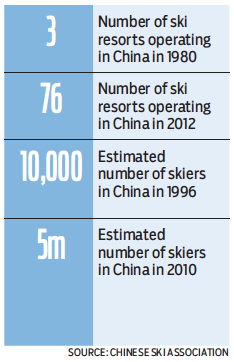If the Beijing 2022 Winter Olympics are to be compared with the city’s 2008 Summer Olympics, China needs to look across the Pacific to Canada for help.
So says Arthur Griffiths, who led Vancouver’s successful 1998 application for the Canadian Olympic Committee’s nod to bid for the 2010 Winter Games. Griffiths is on the board of the fledgling Canada China Sports Foundation (CCSF) and working to link Games experts on both sides of the Pacific.
“Co-operation between future and past organizing committees – the entire process of building a successful Olympic Games begins with a bid book and then promoting your vision,” Griffiths said at the CCSF’s September 25 Beijing Meets Vancouve forum. “The entire journey is based on assistance and the transfer of knowledge from past Winter Olympic committees.”
Beijing edged out Almaty, Kazakhstan, in a surprisingly narrow vote at the end of July. Beijing 2022 will re-use 2008’s Bird’s Nest stadium for ceremonies, Water Cube for curling and National Indoor Stadium and MasterCard Center for hockey.
A new speedskating oval and one of three athletes’ villages will be built in Beijing. But a downhill skiing and sliding sports venue is earmarked beyond city limits in Yanqing, and snowboarding, freestyle and Nordic events are going to Zhangjiakou in Hebei province. A high-speed railway will be built to connect the capital with the two nodes and their respective athletes’ villages.
Opponents were critical of the choice to award the 2022 Games to Beijing based on China’s lack of a free press and Beijing’s notorious air pollution. The Chinese government has promised to get the latter under control. Just as it did for the 2008 Summer Games hosted in Beijing, the Chinese government will temporarily relax visa restrictions on foreign media and allow limited free access to the Internet at Games time.
The Beijing 2022 Games are part of China’s aggressive strategy to drive growth by domestic consumption. It wants a sports industry worth almost $1 trillion by 2025. The U.S. sports industry, already the world’s biggest, is expected to hit US$67.7 billion by 2017, according to PwC.
“China will benefit immensely by working with Canada to promote winter sports in its homeland,” said CCSF co-founder Victor Tsao, co-chairman of the McMillan law firm’s China practice group in B.C.
Griffiths added that a key will be quickly cultivating Chinese winter-sports stars. Emulating Canada’s Own the Podium program, which led to a record 14 gold medals at the Vancouver 2010 Winter Games, is crucial.
China has figure skating, short-track speedskating and freestyle skiing medallists, but it needs to build a viable national hockey program. Though a decision on whether professionals will play hockey at Beijing 2022 is not imminent, an Olympics in the massive Chinese market is an opportunity that neither the National Hockey League (NHL) nor its players’ association can pass up.
“Our city has the ice venues, and [the] snow venues are some distance away, [which] creates challenges and opportunities,” said Griffiths. “The sharing of how to overcome these hurdles that need to be accomplished in hosting the 2022 Beijing Games is also working in close relationship with Vancouver and the experts we have assembled.”
Beijing 2022 also needs practical help in planning and staging the Winter Games, which can be more complex than Summer Games because the snow venues are subject to the elements.
Zhangjiakou and Yanqing will rely on manufactured snow.

The best example of Canadian-Chinese sports co-operation is the Maple Leaf Sports & Entertainment (MLSE)-driven marketing of the NHL in China. CCTV, the national broadcaster, airs weekly games on its sports channel. MLSE has cultivated a roster of five Chinese sponsors, including Huawei, and is hosting a sports business forum in Beijing in mid-November to coincide with Ontario and Quebec trade missions.
In 1980 there were only three ski resorts in China, but at least 76 were operating by 2012. The Malaysian-financed, Ecosign-of-Whistler-designed Genting Secret Garden Resort in Zhangjiakou will host freestyle and snowboarding. The Chinese Ski Association says the country went from 10,000 skiers in 1996 to five million by 2010. By 2013, there were more than 10 million skier visits at Chinese resorts, but money was also flowing out of the country to Japan and South Korea, where experienced and wealthy Chinese visitors went downhill. The inflow of Chinese ski tourists helped several Japanese resorts stem a domestic decline. Cost might be the main barrier to widespread consumer acceptance of skiing in China.
Disposable income for urban dwellers in China in 2013 averaged 26,955 renminbi (US$4,239), and most Chinese skiers rent their equipment and ski only once a year.
Harris/Decima’s 2012 report for the Canadian Tourism Commission stated that the market might have been “overstated and oversold” because many resorts haven’t met projections, and many developers haven’t seen a return on investment.
A day of skiing at one of China’s resorts (lift pass, equipment rental, etc.) costs more than 400 renminbi (about $80). •




